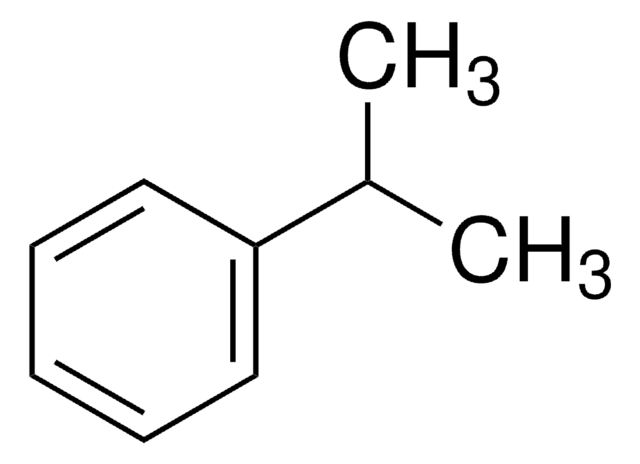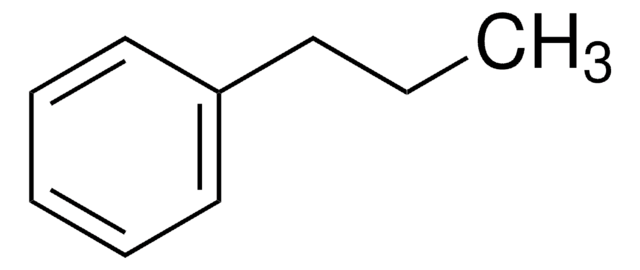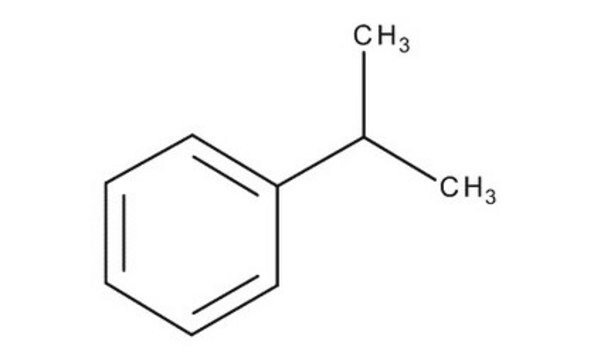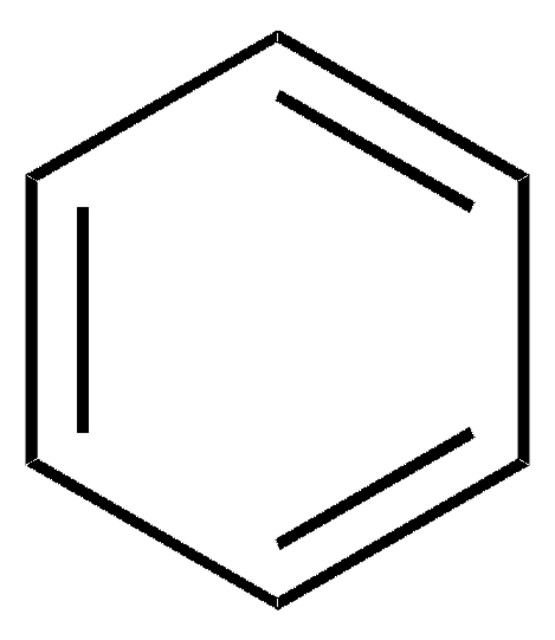28220
Cumene
analytical standard
Synonym(s):
(1-Methylethyl)benzene, 2-Phenylpropane, Isopropylbenzene, NSC 8776
About This Item
Recommended Products
grade
analytical standard
Quality Level
vapor density
4.1 (vs air)
vapor pressure
8 mmHg ( 20 °C)
9.7 mmHg ( 37.7 °C)
Assay
≥99.5% (GC)
autoignition temp.
797 °F
shelf life
limited shelf life, expiry date on the label
expl. lim.
6.5 %
technique(s)
HPLC: suitable
gas chromatography (GC): suitable
refractive index
n20/D 1.491 (lit.)
n20/D 1.491
bp
152-154 °C (lit.)
mp
−96 °C (lit.)
density
0.864 g/mL at 25 °C (lit.)
application(s)
environmental
format
neat
storage temp.
2-8°C
SMILES string
CC(C)c1ccccc1
InChI
1S/C9H12/c1-8(2)9-6-4-3-5-7-9/h3-8H,1-2H3
InChI key
RWGFKTVRMDUZSP-UHFFFAOYSA-N
Looking for similar products? Visit Product Comparison Guide
General description
Application
Signal Word
Danger
Hazard Statements
Precautionary Statements
Hazard Classifications
Aquatic Chronic 2 - Asp. Tox. 1 - Carc. 1B - Flam. Liq. 3 - STOT SE 3
Target Organs
Respiratory system
Storage Class Code
3 - Flammable liquids
WGK
WGK 3
Flash Point(F)
87.8 °F - closed cup
Flash Point(C)
31.0 °C - closed cup
Personal Protective Equipment
Regulatory Listings
Regulatory Listings are mainly provided for chemical products. Only limited information can be provided here for non-chemical products. No entry means none of the components are listed. It is the user’s obligation to ensure the safe and legal use of the product.
PRTR
Class I Designated Chemical Substances
FSL
Group 4: Flammable liquids
Type 2 petroleums
Hazardous rank III
Water insoluble liquid
ISHL Indicated Name
Substances Subject to be Indicated Names
ISHL Notified Names
Substances Subject to be Notified Names
JAN Code
28220-5ML:4548173353463
28220-VAR:
28220-BULK:
28220-25ML:4548173353456
Choose from one of the most recent versions:
Certificates of Analysis (COA)
Don't see the Right Version?
If you require a particular version, you can look up a specific certificate by the Lot or Batch number.
Already Own This Product?
Find documentation for the products that you have recently purchased in the Document Library.
Customers Also Viewed
Our team of scientists has experience in all areas of research including Life Science, Material Science, Chemical Synthesis, Chromatography, Analytical and many others.
Contact Technical Service












